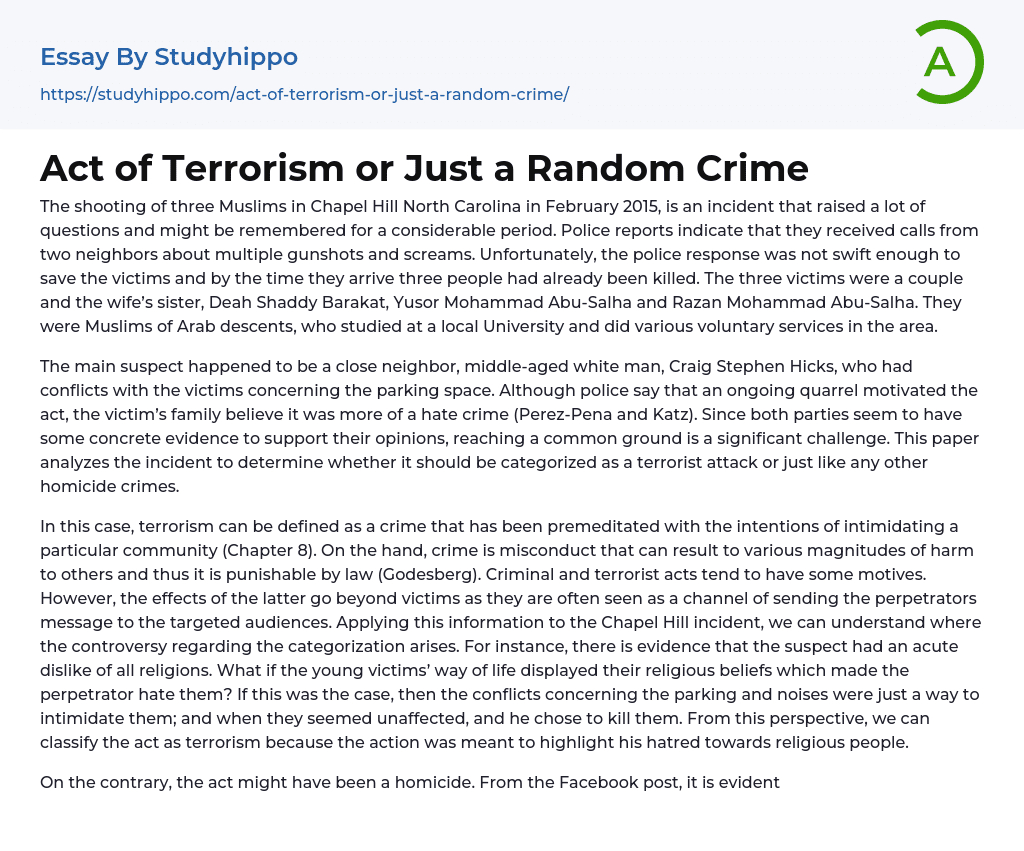The shooting of three Muslims in Chapel Hill North Carolina in February 2015, is an incident that raised a lot of questions and might be remembered for a considerable period. Police reports indicate that they received calls from two neighbors about multiple gunshots and screams. Unfortunately, the police response was not swift enough to save the victims and by the time they arrive three people had already been killed. The three victims were a couple and the wife’s sister, Deah Shaddy Barakat, Yusor Mohammad Abu-Salha and Razan Mohammad Abu-Salha. They were Muslims of Arab descents, who studied at a local University and did various voluntary services in the area.
The main suspect happened to be a close neighbor, middle-aged white man, Craig Stephen Hicks, who had conflicts with the victims concerning the parking space. Although
...police say that an ongoing quarrel motivated the act, the victim’s family believe it was more of a hate crime (Perez-Pena and Katz). Since both parties seem to have some concrete evidence to support their opinions, reaching a common ground is a significant challenge. This paper analyzes the incident to determine whether it should be categorized as a terrorist attack or just like any other homicide crimes.
In this case, terrorism can be defined as a crime that has been premeditated with the intentions of intimidating a particular community (Chapter 8). On the hand, crime is misconduct that can result to various magnitudes of harm to others and thus it is punishable by law (Godesberg). Criminal and terrorist acts tend to have some motives. However, the effects of the latter go beyond victims as they are often seen as a channel of
sending the perpetrators message to the targeted audiences. Applying this information to the Chapel Hill incident, we can understand where the controversy regarding the categorization arises. For instance, there is evidence that the suspect had an acute dislike of all religions. What if the young victims’ way of life displayed their religious beliefs which made the perpetrator hate them? If this was the case, then the conflicts concerning the parking and noises were just a way to intimidate them; and when they seemed unaffected, and he chose to kill them. From this perspective, we can classify the act as terrorism because the action was meant to highlight his hatred towards religious people.
On the contrary, the act might have been a homicide. From the Facebook post, it is evident that the suspect was an atheist who hated all religion as he believed they were baseless. Given that he was undergoing a hard time (divorce), he might have been under some form of depression that made everything else meaningless. Therefore, the young, vibrant Muslims seemed like a constant reminder of his mysteries. Then why the three Muslims and not any other staunch Christian within the neighborhood? It could be because it is easy to note a Muslim in a crowd given their dressing code which is not the case with Christians. But why the three and not any other Muslim in the region? Maybe it is because they were neighbors and their interactions had heightened his hatred towards the three religious and happy Muslims. Comparing this incident to Charlie Hebdo’s attack that happened in Paris in the same year, whereby the attackers seemed to be fulfilling their
duties, Craig act was for personal gratification rather than a duty.
It can be agreed that although the Chapel Hill incident is straight forward, the influence of external factors has significantly affected the case. Both parties need to collaborate to reach a conclusion regarding the case because each side i.e. the police and the victims’ families seem to be omitting some details. However, if we take an ethical stand, Craig’s action can be classified as terrorism because he failed to respect diversity within the community and let his personal emotions control him. This incident can be aligned by the saying “…one man’s terrorist is another man’s freedom…” in this case, he murdered the three people because of his hatred towards religion, in a way he was seeking personal freedom from constant reminders of all that he despised.
Works cited
- Chapter 8. "Ethics and the " War on Terrorism."" Chapter 8 1 January 2008: 259. Document. <http://www.sagepub.com/sites/default/files/upm-binaries/23182_Chapter_8.pdf>.
- Godesberg, Forum-Verlag. New Definitions of Crime in Societies in Transition to Democracy. 1994. Document. <https://books.google.co.ke/books?id=1wrZXMPAUgC&dq=crime+definition&source=gbs_navlinks_s>.
- Perez-Pena, Richard and Jonathan M Katz. "In Chapel Hill Shooting of 3 Muslims, a Question of Motive." The New York Times 11 February 2015. Documents. <http://www.nytimes.com/2015/02/12/us/muslim-student-shootings-north-carolina.html?_r=0>.
- Animal Cruelty essays
- Charles Manson essays
- Crime Prevention essays
- Crime scene essays
- Criminal Justice essays
- Criminology essays
- Cyber Crime essays
- Damages essays
- Detention essays
- Distracted Driving essays
- Drug Trafficking essays
- Drunk Driving essays
- Forensic Science essays
- Gang essays
- Hate Crime essays
- Homicide essays
- Identity Theft essays
- Juvenile Crime essays
- Juvenile Delinquency essays
- Juvenile Justice System essays
- Law Enforcement essays
- Murder essays
- Organized Crime essays
- Penology essays
- Piracy essays
- Prison essays
- Property Crime essays
- Prostitution essays
- Punishment essays
- Punishments essays
- Rape essays
- Robbery essays
- Serial Killer essays
- Sexual Assault essays
- Sexual Assault on College Campuses essays
- Sexual Harassment essays
- Sexual Offence essays
- Stealing essays
- Surveillance essays
- Ted Bundy essays
- Victim essays
- Violent crime essays
- White Collar Crime essays
- Adaptation essays
- Adventure essays
- Adversity essays
- Aging essays
- Alcohol essays
- Barbie Doll essays
- Beauty essays




